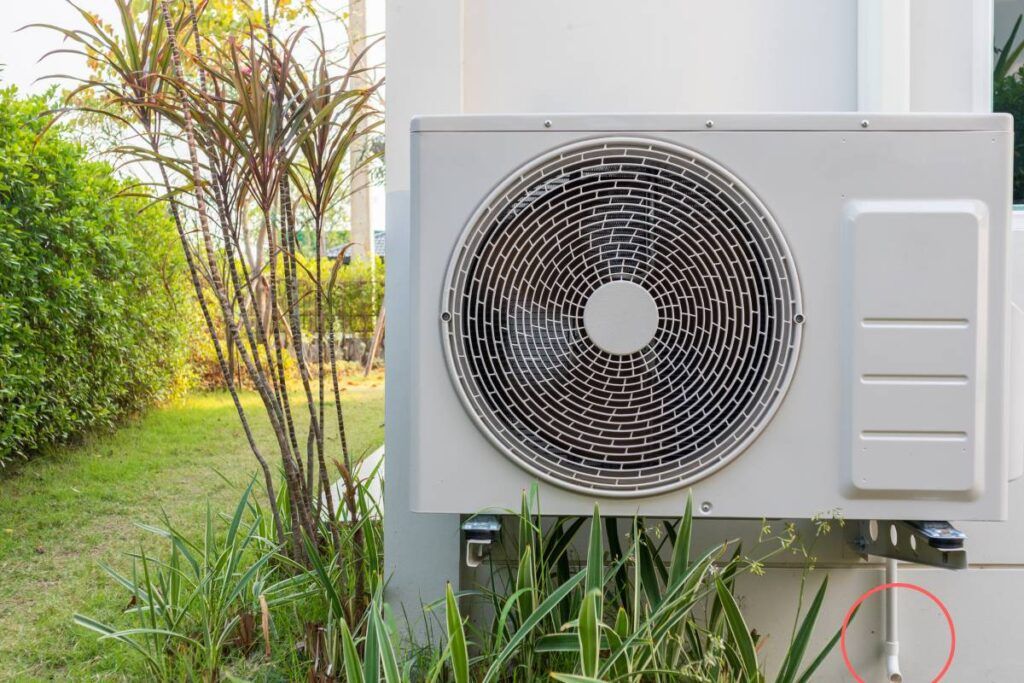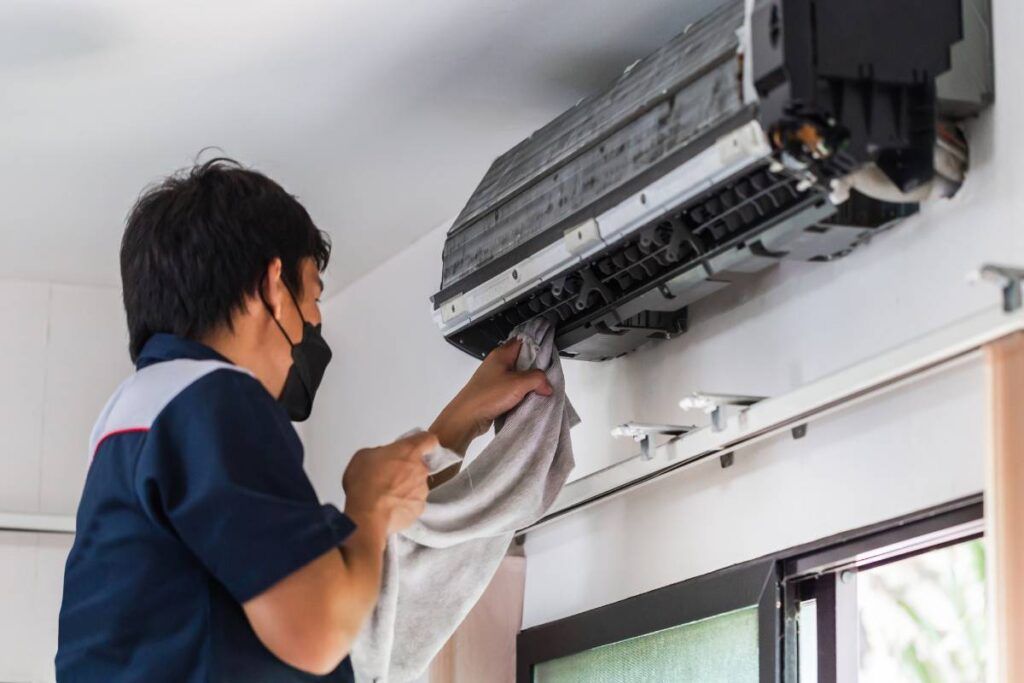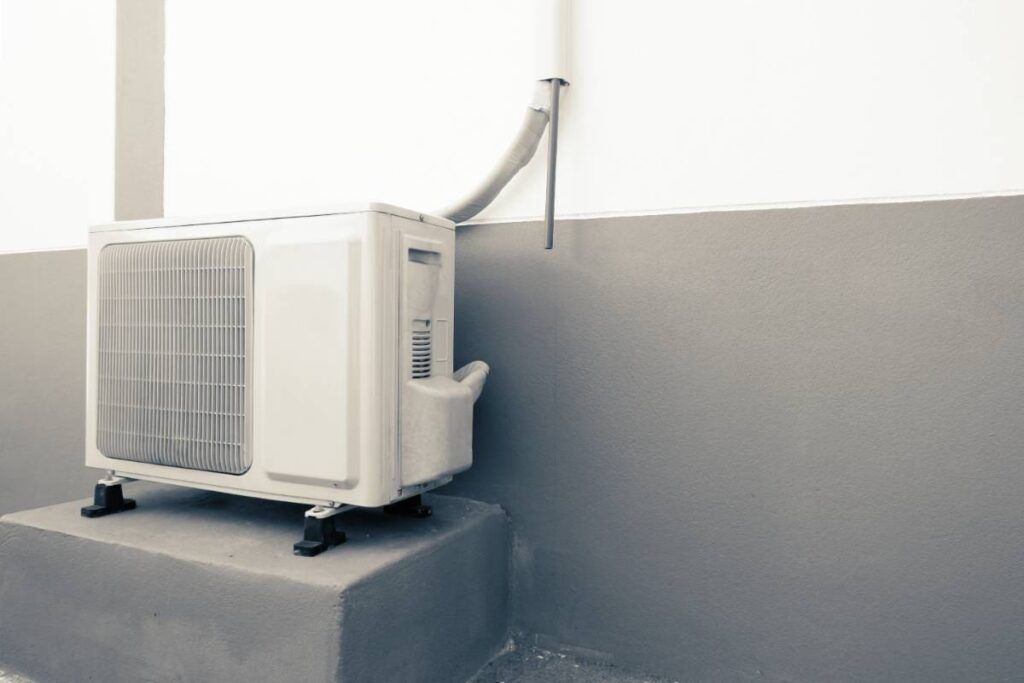Air conditioners are meant to cool down your house and comfort you, mostly during the summers. Generally, your air conditioning unit won’t need anything from you except for the thermostat adjustment. However, it is concerning if it makes loud noise during operation.
An AC makes loud noises due to loose or broken parts, faulty capacitors, clogging due to outdoor debris, or a refrigerant leak. Tighten the screws, clean the coils, remove debris, and fix the refrigerant tank. Consider soundproofing for the inside and outside units to reduce the noise.
There are many other reasons behind a noisy AC, and we have outlined them all in this guide. Since there are numerous reasons, you must confirm the real cause and troubleshoot it. If confused, hire a professional to deal with it.

Check out our list of top-handpicked products for all your electrical, appliance, and HVAC system needs to keep your home running smoothly.
This post includes some affiliate links.What types of noise does an air conditioner make?
When something is wrong with your air conditioner, it has symptoms, for example, leakage, not working, insufficient cold air, loud noises, etc.
In terms of noise, the air conditioner makes different types of alarming and loud noises, for example:
- Humming
- Buzzing
- Screeching or squealing
- Clicking or tapping
- Rattling or clanking
- Whistling
- Crackling
- Banging
- Hissing
- Whistling
Different noises will mean different types of problems. Sometimes, one noise type could mean different problems.
So you must identify the noise type and detect the right problem behind a noisy air conditioning unit.
Why does my air conditioner make loud noises?
There are many reasons behind a noisy air conditioner. Some of them include the following:
- Loose or broken parts
- Failed thermostat or defective control
- Loose fan spades
- Clogging
- Refrigerant leaks
Let’s get to the reasons behind the noise and how to solve it.
1. Dirt particles are stuck inside the condenser.

Your air conditioner will have a banging or rattling noise due to dirt particles accumulated inside the condenser.
The condenser will collect sticks, leaves, and other direct particles inside, especially if the outdoor unit is close to the trees and shrubs.
The small leaves and twigs will get stuck inside the condenser, and you will probably forget to remove them.
The dirt and debris block the condenser from releasing the hot air out of your house.
Handling the outdoor unit is easier than the indoor one.
Remove the condenser cover to throw away the stuck materials.
Ensure your outdoor unit is at least 2 to 3 feet away from the trees and shrubs.
2. Loose wires
Your air conditioner will make a loud buzzing noise if there are any loose or exposed wires in your unit.
You must turn off your unit to avoid electric sparks and call for the experts to fix the wires.
3. Loose screws and components
A rattling sound indicates a problem – loose screws in your air conditioner.
Both indoor and outdoor units can have loose screws and make loud rattling noises whenever you turn them on the unit.
Sometimes, you will also hear buzzing noises if any parts inside the air conditioner are loose.
Over time, the vibration will increase along with the noise.
Check your units carefully and tighten the screws and other parts with a screwdriver.
4. Broken fan motor or compressor

If your air conditioner makes a loud banging noise, it could be due to the broken motors or compressors or an imbalance fan.
You can bend the fan blades of an imbalance fan and bring them to an even position. Make sure to be gentle about it.
Replacing a compressor or a motor can be very costly.
So, if your air conditioner is quite old, give up the unit instead of replacing the compressor.
5. Faulty fan motor and bearings
When you turn on the air conditioner, you will hear a screeching or squealing noise, like metal-on-metal.
It is probably due to faulty fan motor bearings.
Replace the motor bearings to avoid noise.
A faulty motor causes a loud buzzing noise, especially when the copper lines connected to the AC face obstruction or the lines are rubbing against each other.
You must keep the lines well-insulated and reduce the metal-on-metal contact.
6. A worn-out or broken belt
An old or broken fan belt will also create a squealing noise from your air conditioner, especially in ducted or central units.
In the older models, a belt connects the motor to the fan.
This belt can wear out over time and create annoying noises.
High humidity levels are also considered the culprit behind the constant contraction and expansion of the belt in summer, creating an unpleasant noise.
You must contact the HVAC expert team to replace or repair the belt.

7. High pressure in the compressor unit
Another reason behind a hissing noise transferring to a high-pitched squealing noise is excessive pressure in the compressor unit.
Please turn off the air conditioner whenever you hear the noise because it can cause an explosion.
Please call an HVAC professional team to help you here.
8. Loose fan blade or coil
Fan blades or coils become loose over time.
As a result, your air conditioner will release a loud pulsating noise.
To solve the problem, tighten the screws of the blades and the coils.
Soon your unit will be back to normal.
9. Air conditioner plastic base
If your air conditioner has a plastic base, the compressor’s motion will cause the whole unit to create a pulsating noise.
To prevent the problem, you need to replace the plastic base or pad with a wooden one.
It will reduce the vibrations and the noise.
You can do it yourself by clamping the unit down on the pad and then supporting it over small rubber blocks.
10. Refrigerant coming in contact with the air conditioner walls

When the refrigerant line touches the walls of the air conditioner, there will be a loud pulsating noise.
When this happens, check for the contact, move the lines slightly away from the wall, and add insulation with the help of rubber or foam material.
11. Leaking refrigerant
Your air conditioner will make a loud hissing noise when it leaks the refrigerant liquid.
Over time, the tubes get rusted, cracked, or eroded, for which the fluid will start leaking.
The fluid leakage can cause damage to the refrigerant tank.
The leakage won’t let your room stay cool.
You must call an HVAC expert to repair, seal, or replace the tank and refill the fluid again.
If the refrigerant lines are improperly sealed, you will hear a loud bubbling or gurgling noise from your unit.
These sounds indicate the very problem.
So you don’t have to waste time guessing it.
The air gets trapped inside the lines, therefore making a gurgling sound.
12. Compressor valve leak
The compressor valve leak will make your air conditioner release a hissing sound.
The valve controls the pressure of the refrigerant.
So, you must hire an HVAC professional to fix the problem.
Otherwise, it can lead to severe damage.
13. An obstacle in the air conditioner fans

Your air conditioner’s outdoor unit will make a clicking sound when there is an obstacle in the fans.
You need to remove the obstacle from the fan.
Remove the unit’s cover and wipe out the fans properly.
Maintaining regular maintenance of the unit can prevent the problem.
14. The capacitor loses the charge.
If the capacitor loses its charge, you will hear a loud clicking sound from your air conditioner.
When the capacitor loses its charge, it cannot power the compressor anymore. As a result, your air conditioner will release a clicking noise.
The noise occurs because the outdoor unit is constantly trying to turn on.
You must hire an expert for a checkup.
15. Capacitor breakdown
You will hear a loud buzzing noise if the capacitor has gone bad, which is later transferred to a loud grinding noise.
It is the pistons of the compressor that makes the noise.
A good capacitor will store the energy until the unit needs it.
Slowly, it releases the energy to power the outside AC unit.
A bad capacitor will prevent the fan from turning on despite the current flow, causing a buzzing sound.
A trained HVAC technician will help you repair or replace the capacitor after a thorough inspection.
16. Fault in the electrical signals

Faulty electrical signals make the switches turn on and off constantly, producing clicking noises from the unit.
If you find small sparks accompanying the clicking noises, shut down your air conditioner and call the local HVAC team for a lookout.
Sparks can be dangerous.
17. Loose air conditioner fan
Sometimes the air conditioner’s fan will become loose and hit the outdoor unit.
As a result, you will often hear a loud clicking noise from the unit.
You need to call an HVAC expert to look at the AC fan.
The team will look into the condition and may tighten the fan with a screwdriver, or they will replace the fan.
18. Malfunctioning thermostat
A malfunctioned thermostat will make your air conditioner make a loud clicking noise.
Besides, it won’t let your unit work properly.
When a thermostat works normally, the clicking sound will be very mild and soft.
The sound is of the relay switch when it sends power to the air conditioner.
If the relay switch is broken or has wire issues, the switch will send power, but you will hear a loud clicking noise.
However, it won’t let your unit turn on.
You need to contact a professional as you cannot fix it yourself.
19. Leaking AC duct

The leak in your air conditioner’s duct will make loud whistling noises.
The solution is to seal the leakage in the ductwork.
Besides the whistling noises, your energy bills will also increase.
20. Obstruction in the airflow
If the AC’s airflow gets obstructed for some reason, the high pressure in the blower fan motor will have high-pitched whistling noise due to the lack of air.
The dirty air filters are the main reason behind obstructed airflow.
The dirt and debris create a thick layer and make the blower motor pull the air into the unit forcefully.
The air that passes through the cracks forcefully will make noises.
You must replace or wash the air filters every 3-4 months.
21. Low lubricant level
When a motor releases a loud humming sound, it indicates that the lubricant level is low.
If the air conditioner runs without a lubricated motor, the humming sound will change into a loud grinding noise.
You can do it yourself if you have done it before. Otherwise, call professionals to lubricate the motor.
Lubricating the motors every summer and winter will prevent the noise
22. Contactor failure
The contactor controls the electricity flow to the air conditioning unit.
It is like a bridge that connects the unit to the power supply.
When you turn off the air conditioner, the contactor will open to disable the power.
When you turn it on, the reverse occurs, and the power supply returns.
If the contactor fails, the air conditioner will make a humming noise because the unit will receive the power but fail to turn on.
If the problem persists, the humming noise will progress to a loud buzz.
You can correct the problem with a slight tapping if the contactor is stuck.
Otherwise, you will need a professional’s help.
23. Bent fin coils
The air conditioner will make a humming noise if the fin coils have bent.
You can fix the fin coils using a metal comb to straighten the bent coils.
Maintaining the unit from time to time can prevent the fin coils from bending and keep them in the best shape.
24. Frozen evaporator

When you set the temperature very low, the moisture fails to drain properly.
Additionally, the evaporator’s coils will freeze due to dirty fins.
When you find ice falling from the air conditioner’s coils, it will make a cracking sound.
You need to disassemble the air conditioner to access the fins.
Wash them with soap water thoroughly and let them dry.
You should only do it yourself if you have done it before.
Otherwise, call for a professional’s help.
25. Malfunctioned compressor
If you hear loud buzzing noises from the air conditioner, it is probably due to the malfunctioned compressor.
If the air conditioner still gets power after the compressor has malfunctioned, you will hear a buzzing noise.
You need to replace the compressor with the help of a professional. Compressors can be very expensive.
Before replacing, see if your AC will work well after this.
If the unit has been very old, you can replace the whole unit and get a new one instead of only buying the compressor.
26. Frozen AC parts
A loud buzzing sound is heard from the air conditioner if the AC parts are freezing.
It mostly happens in indoor units due to low refrigerant or low thermostat settings.
It would be best to hire an HVAC to find out which of these reasons causes the freezing.
27. Excessive moisture in the unit

Blockage in the condensate lines creates moisture buildup, causing a bubbling sound.
The line helps remove the moisture collected by the air conditioner.
If the water cannot release from the line, it will make bubbling or gurgling noises. ‘
The same happens when the condensate pump gets damaged.
The pump pumps the water from the drain pan to the condensate line to exit your house.
Excessive moisture buildup in the pump will make bubbling sounds.
Disassemble your air conditioner to check the drainage line.
However, you cannot do anything here. Get an expert’s help to fix the problem.
How to make the air conditioner quiet?
Sometimes, solving the above problems is the only way to reduce noise from your air conditioner.
But if you consult the HVAC experts and they do not find anything wrong with your air conditioner, you will need to find ways to reduce the noise.
Soundproofing the unit is one of the best ways to make your air conditioner quiet or less noisy.
Reducing noise in the outdoor unit

To reduce noise in the outdoor unit, you can do the following three things:
1. Sound blanket
You can install a sound blanket inside the unit.
A sound blanket does not mean you will be cozying the unit with something fluffy.
The sound blanket will be installed inside the unit on top of the compressor to stifle the sound.
2. Sound wall
Create a barrier between the outdoor unit and your house with the help of a fence that can muffle the sound of the air conditioning unit.
The wall will dampen the unit’s sound and keep dirt and debris from entering. Besides, it also gives your house an appealing look.
3. Landscaping
You can plant shrubbery surrounding your outdoor AC unit to reduce the noise.
Ensure the landscape upkeep plant is in place to prevent the leaves, sticks, and twigs from entering the unit.
Reducing noise in the indoor unit
Follow the following tips to reduce noise from the indoor unit:
1. Unit Placement
Choosing the right position for your unit can help prevent noise.
Install it away from living rooms, bedrooms, or patio areas.
Also, ensure that the room does not reflect the noise of your AC, for example, brick walls.
Areas with reflective surfaces increase the noise greatly.

2. Insulation
Add a mat to absorb the vibrations and noises of your unit.
You can also cover the air ducts with sound-absorbing foam to decrease the noise and prevent it from getting carried inside the house.
When should I replace the noisy air conditioner?
You need to call an expert for a thorough checkup when your unit makes loud and alarming noises.
If your unit has become quite old and frequently makes weird noises, you can replace the whole unit instead of just the parts.
Excessive noise from older units is a sign of deterioration.
Buying a new air conditioner will be less noisy and energy-efficient.
To prevent noises, allow regular maintenance.
The HVAC team can inform you about what is wrong with your unit and what and how quickly you should fix things.
Also Check:
- 12 Reasons Your Air Conditioner Smells Bad (+Fix)
- 11 Reasons Your Air Conditioner Is Leaking Water (+Fix)
- 15 Reasons Your Air Conditioner Is Not Cooling (+Fix)
- 18 Reasons Your Air Conditioner Won’t Turn On (+Fix)
- 12 Reasons Your Air Conditioner Won’t Turn Off (+Fix)
- 17 Reasons Your Air Conditioner Is Not Working (+Fix)
Final thoughts
An air conditioner can make loud noises, like cracking, clicking, gurgling, hissing, grinding, etc.
There are various reasons behind a noisy air conditioner.
You can understand the cause of the noise type.
Though the article can help you identify the right cause of the noise type, it is better to hire an HVAC expert to confirm and fix the problem.
Calling professionals will help fix the problem faster, preventing serious problems and high expenses.
